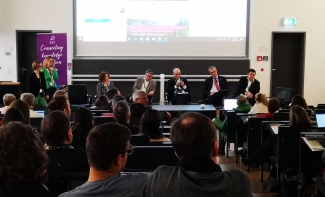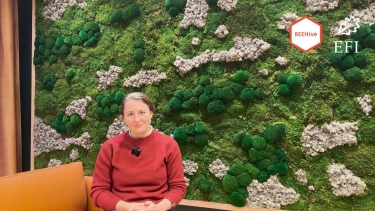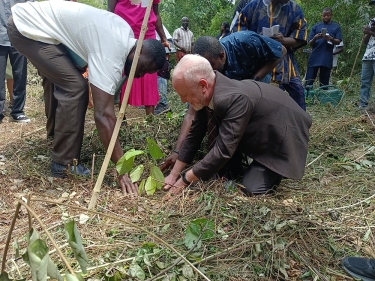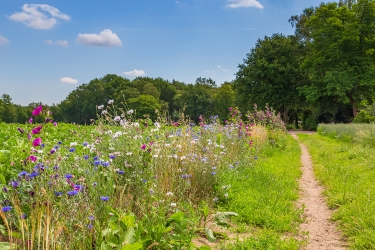Interviews on Integrated Forest Management

EFI with the documentary filmmaker Patrick Augenstein had the opportunity to interview six of the policymakers and researchers attending the INFORMAR final conference in February: Luc Bas at the International Union for Conservation of Nature (IUCN) European Office, Eva Müller at the German Federal Ministry of Food and Agriculture (BMEL), Robert Nasi at the Centre for International Forestry Research (CIFOR), Natalia Lukina at the Russian Academy of Science, Klaus J. Puettmann at Oregon State University, and Eeva Primmer at the Finnish Environmental Institute (SYKE).
Each interview investigated what each participant brought to the conference as their main message as well as explored their personal opinions to difficult questions like “What needs to happen for the UN Decade for Ecosystem Restoration to be successful?”. The interviews are captivating and engaging, providing an inside perspective of each interviewee’s unique experiences with managing and governing forests around the world including in Germany, Finland, the US, Honduras, Costa Rica, and the Democratic Republic of the Congo.
Interestingly, despite the diversity of countries the interviewees have lived and worked in, and their range of their different experiences with forest management, many of them brought this similar main message to the conference: The polarisation of discussions of forest management must be replaced with integration if we wish to make any significant progress towards sustainability. This is especially important in the management of ecosystem services. Natalia Lukina explains in her interview “We need segregation with integration, and integration with segregation” that discussions are usually held by those strictly for segregation of ecosystem services and those who push solely for integration, the high polarisation hindering any progress in the subject.
At the frontline of concern for many of the interviewees was also the lack of urgency and concern by the general public. Luc Bas in his interview “Overconsumption is a driver of many of our environmental trade-offs” explains that because many people cannot see the direct impact of their behaviour on the environment, overconsumption is pushing the limits of the planetary boundaries. Without the support of the public, progress in sustainability may be undermined.
But ideas between the five participants were not all similar. Questions like “Why have we not made as much progress in restoration as we have aimed for?” or “What needs to happen in the UN Decade of Ecological Restoration?” gathered unique perspectives. Eva Müller in her interview “Political commitments are not enough” shares her thought that although there is evidence of political commitments for restoration all around the world, in reality fulfilling these commitments is difficult due to high costs and risk of negative consequences to local populations living in the landscapes. While Klaus J. Puettmann’s thoughts on the question are bit more theoretical, explaining in his interview “Ecosystems are a lot more resilient than they have given them credit for in the past” that we need a new “blue-print” to guide restoration as we head into the uncharted territory of global challenges never seen before.
The interviewees also take us outside of Bonn and the conference, transporting us to exciting and extraordinary forests around the world. Robert Nasi in his interview “The informal sector can be a driver for degradation and deforestation or it can cause or result in sustainability” takes us to the second largest rainforest in the world, the Congo Basin, where he explains the importance of the informal sector and the complex role of indigenous people in forest management. We also get a glimpse of what inspired these researchers and policy makers to become interested in forests and forest management when we briefly visit the landscape of Eeva Primmer’s hometown in Finland in her interview “We need to understand our dependence on sustainable ecosystems” where people have remarkably adapted to living with nature that is often extreme.
The interview series is not only a great insight into the challenges of forest and forest ecosystem services management, but also a beacon of hope in time of COVID-19, climate change, and other environmental issues. Each interviewee has their own personal reasons for staying motivated and give us inspiration for following their footsteps in tackling the most pressing global challenges of our time. All interviews can be found on EFI’s Resilience Blog.


